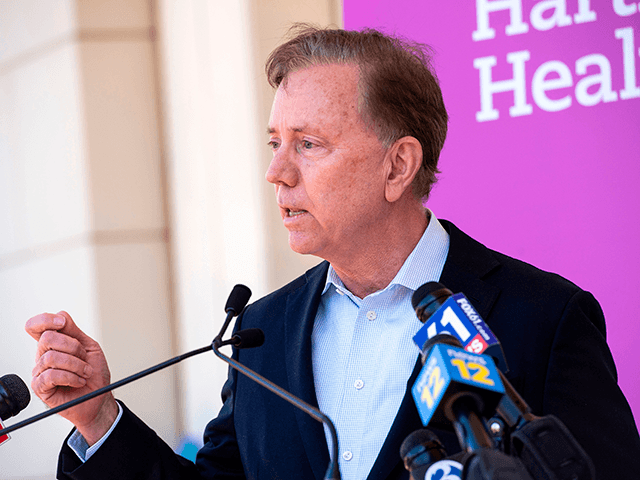Connecticut Gov. Ned Lamont (D) plans to end capacity restrictions on restaurants, retail stores, other businesses, and houses of worship beginning March 19, but still require social distancing and masks in these same settings, he announced Thursday.
ICYMI: Watch today's news briefing with the latest updates on COVID-19 in Connecticut https://t.co/6es6dEUsrX pic.twitter.com/Tw0OjlRC3I
— Governor Ned Lamont (@GovNedLamont) March 4, 2021
In exclusive comments to Breitbart News, radio host Todd Feinburg said of the anticipated lifting of restrictions, “Any suggestion that the governor of Connecticut is being accommodating to a conservative, liberty-based viewpoint regarding shutdowns is just fake news.”
“It’s only a big restaurant that would have enough space that they’d be able to have their full capacity there, that it would be enough to make a difference to even the number of covers they’re able to do in a night,” explained Feinburg, host of The Todd Feinburg Show on WTIC, Connecticut’s dominant conservative talk station.
“So, if you have a restaurant that’s rated for 100 people, and social distancing pushes you down to 65, then you’ve gotten a little bit of improvement, but you’ve still got the same logistical issues that restrict your capacity,” he added.
According to the planned revised regulations, tables in restaurants may have no more than eight patrons, and must be spaced six feet apart or separated by Plexiglass shields. Additionally, the 11 p.m. curfew will remain, and bars that do not serve food will still be closed.
While we are revising some of the COVID-19 protocols on capacity and travel restrictions, those related to face coverings, social distancing, and cleaning measures, among others, are being maintained, and we urge everyone to continue following them.
🔗https://t.co/A7hzMFRCWy pic.twitter.com/uPg8MhGgaR
— Governor Ned Lamont (@GovNedLamont) March 4, 2021
Lamont emphasized Connecticut would not be following the path of other states that have ended mask mandates and other restrictions.
“This is not Texas. This is not Mississippi. This is Connecticut,” the governor said. “We are maintaining the masks.”
“I think I told you at the start, I think over the course of a year, we know what works, and masks work,” Lamont added, crediting the wearing of masks as “good defense” leading to the trend of fewer fatalities associated with the virus.
The governor added his “vaccination plan” was “good offense.”
In February, as CT Post reported, Lamont reversed his COVID-19 vaccination priority plan from simple age groupings, beginning with the oldest residents, to include teachers, “shifting priority away from essential workers and those with underlying medical conditions.”
The Post continued:
While state officials touted the new plan as a more efficient way to ramp up vaccinations, the approach deviates from guidance from the U.S. Centers for Disease Control and Prevention. And groups including the American Civil Liberties Union, the CT Food Association and several labor unions criticized the governor for leaving behind frontline essential workers and those with medical conditions that make them more susceptible to COVID complications.
“The educator clinics are going, are underway right now,” Lamont said during the briefing Thursday. “We have 100 facilities around the state getting our, um, our educators vaccinated. That’s not just teachers, but the paras, and the nurses, and the food service workers, and the custodians, and the drivers and everybody related to keeping our schools open.”
According to the data presented, approximately 60 percent of Connecticut residents who are 65 years of age and older have received a COVID vaccine, leading to a drop in hospitalizations, deaths, and new cases of the coronavirus.
Lamont said, “Connecticut has earned” the change in restrictions.
“You know, it’s been tough, and people have been frustrated,” he added. “They’ve been sheltered at home, and a lot of our businesses really suffered, and people took a hit.”
Feinburg said Lamont is attempting to achieve a political goal of appearing to be keeping people safe while moving the economy along.
“The problem in my mind with having politicians who have to run for office, managing things centrally, is that they aren’t concerned primarily about the effective management of the state; they’re concerned about the effective management of their political careers,” he said, and continued:
So, if you’re governor in a state like Connecticut, where there is actually a strong threat of conservatism and libertarianism, along with a strong force of leftism, the left wants you to take care of them, because that’s what Democrats sell: ‘We care for you we want to keep you safe.’ But there’s this whole other chunk of the population that wants to be left alone and believes in the American system of government that government should stay out of our way, and only be taking care of the things minimally that you need a government to be doing.
Feinburg said the governor’s motivation is to satisfy both sides, but over the long term the damage that ultimately hurts political careers is likely what happens to the economy.
“And it’s not hard to imagine that, once the virus is gone and under control, assuming the vaccines are able to bring that result, then people are going to be thinking about the economy and looking at how incredibly damaged the country is,” he said.

COMMENTS
Please let us know if you're having issues with commenting.